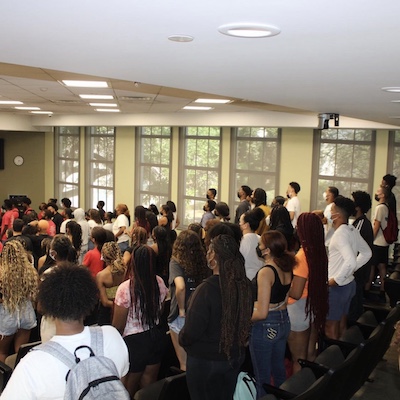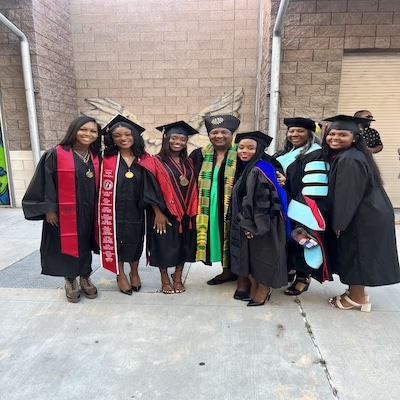HENRIETTA GOODWIN SCHOLARS PROGRAM
The Henrietta Goodwin Scholars (HGS) program seeks to support student success through academic programming design and to facilitate their transition in, through, and out of San Diego State University. Henrietta Goodwin was the first African American student to graduate from San Diego State University in 1913. We continue her legacy of resilience, education, and Black excellence.
STUDENT TESTIMONIALS



"I have gained a greater sense of belonging on campus by studying alongside a group of peers that look like me."
"I love HGS seminar class! I get to connect and have fun with peers who share the same experiences I have."
"I can rely on my professor, HGS peers, and HGS coach for mentorship and academic support. I know I'm not alone."
PROGRAM BENEFITS
- Access to program and Gus & Emma Thompson Black Resource Center based scholarships
- Pre-enrollment into HGS seminar class and general studies classes relevant to your degree completion
- Personal Academic Peer Mentor for assistance with engagement outside of the classroom, planning for academic success, adjusting to campus life, and answering questions, needs, or concerns
- Personal Coordinated Care Advisor for academic and navigational support
- Access to Gus & Emma Thompson Black Resource Center Academic Advisor for major specific academic advisement and support
PROGRAM OUTCOMES
- Degree attainment
- A sense of belonging and community at SDSU
- Build positive relationships with peers, staff and faculty
- Explore opportunities for learning within and beyond the classroom
- Explore and utilize appropriate campus resources
- Identify and effectively manage personal, academic, and career goals
- Identify and adapt well-being strategies that support personal and academic journey
- Explore and affirm personal identity and intersectionalities
- Explore and develop personal leadership style, cultural strengths and their connection to current and future goals
- Enhance communication skills
- Adapt and apply appropriate academic strategies to their learning
- Identify relevant academic policies, processes, and resources related to their academic success and timely attainment of degree requirements
- Develop and acquire financial wellness strategies
- Develop professional development skills
- Explore post graduate opportunities to graduate studies and career exploration
HGS PROGRAM COURSES
The HGS first year seminar course is designed to facilitate students’ integration into the SDSU learning community. Through co-curricular and culturally relevant curriculum, students acquire and enhance skills for academic success, identity development/empowerment, leadership and professional development, and economic empowerment.
The HGS second year seminar course is designed to increase student persistence and success through co-curricular and culturally relevant curriculum designed to cover academic resources applicable to sophomore year in college. Curriculum includes academic success, career exploration, leadership and professional development, and economic empowerment.

In addition to the HGS seminar course, the program package includes courses from SDSU's Department of Africana Studies. HGS students will be pre-enrolled in either a composition, oral communication, African American History, or Africana Literary Study course. All Africana Studies courses explore African/Black life, histories and experiences and count towards general education requirements for undergraduate degree programs.
Practice in speaking, critical listening, reasoning and organizing. Theory and techniques of communications used to evaluate the effect they have on the lives of Blacks and others.
Note: Satisfies oral communication requirement
American history from a Black perspective.
Note: Satisfies the American Institutions requirement in American history and United States Constitution. This course satisfies the ethnic studies [ES] requirement.
American history from a Black perspective.
Note: Satisfies the American Institutions requirement in American history and California government. This course satisfies the ethnic studies [ES] requirement.
Oral and written literature produced by people of African descent. How Africana people use language to communicate their history and culture. Basic literary vocabulary, techniques, and theories for the non-specialist.
Note: This course satisfies the ethnic studies [ES] requirement.
